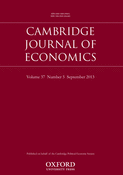Date/Time
Date(s) - Thursday, December 13, 2018 - Friday, December 14, 2018
All Day
Categories No Categories
Workshop: How to Conceptualise Financialisation in Developing and Emerging Economies? Manifestations, Drivers and Implications
13-14 December 2018
Girton College, University of Cambridge
Workshop Overview & Programme
Workshop Program_HERE
Papers for the workshop can be access using the password and downloaded HERE

The discussions of the processes behind the growing importance of finance, financial transactions and financial motives, as well as the sustainability of the financial systems, have been located in the critical political economy debate of financialisation and neoliberalism. So far the analysis of financialisation has been largely focused on developed economies. Studies on developing and emerging economies (DEEs) have been unsystematic and largely empirical with a focus on financialisation phenomena observed in developed countries. This workshop aims to provide an assessment of the financialisation process in DEEs and stimulate conceptual discussions of whether, and if so how, financialisation is distinct in DEEs. Further, considering the argument that the term is either ill-defined or used without a clear agreed-upon definition, the workshop also aims to pursue more clarity on what financialisation means.
Despite the rising interest in the issue of DEE financialisation, its manifestations, drivers and implications, many questions still remain unanswered. For example, what, if any, are the specific features of financialisation in DEEs? Can domestic public debt or high interest rates or a subordinate aspect be such a feature? What is the link between DEEs’ specific financialisation features and their ‘real’ international integration into international production networks? Does mapping the phenomena encountered in the Anglo-Saxon core onto DEEs overlook the structural differences of these economies and, therefore, their different financialisation practices and features? Also, can financialisation processes be compared between DEEs? What are the roles of different institutions, policies and indeed locational factors in shaping these processes? Can the notion of “variegated financialisation” be helpful in these respects? Similarly, is financialisation driven rather by international factors or by autonomous domestic political economy processes? Empirically, is it possible to delineate financial development and deepening from financialisation in DEEs, and to what extent can it be quantified?
Finally, considering the lack of consensus on what financialisation means, an indicative, but by no means exhaustive, list of questions that were addressed included:
• How can financialisation in DEEs be conceptualised? What is the contribution of different disciplines in analysing financialisation in DEEs
• How can financialisation be located empirically in DEEs? Can it be quantified?
• What are the distinct features of financialisation in these regions?
• What are the commonalities and differences between DEEs’ experiences with financialisation?
• What is the relationship between financialisation in DEEs and financialisation in advanced economies? Is DEE financialisation largely driven by their relation with developed countries or are these autonomous processes?
• What is the role of national institutional, spatial and macroeconomic factors in shaping financialisation phenomena?
• How is financialisation related to the ‘productive’ international integration of DEEs?
• What is the role of the State in shaping financialisation in DEEs? Are there specific actors influencing the process?
• What are the implications of financialisation for development?
• What is the difference between financial deepening and financialisation?
• What are the policy implications of financialisation of DEEs?
Workshop Registration, Cost and booking
Registration is now closed.
Workshop Venue
The conference took place in the Stanley Library and Old Hall, at Girton College, Huntingdon Road, Cambridge, CB3 0JG. Girton has a visitor car parking onsite. See the College webpage for further direction to the College.
Accommodation
Speakers and participants who wish to stay on the college grounds need to book their own accommodation directly with Girton College at conferences@girton.cam.ac.uk. The rooms are all single en-suite, with towels provided. The cost of these rooms is £65+VAT per night, with breakfast in the cafeteria included. Any attendee who wishes to book a different accommodation is welcome to do so. There are a few of other options nearby, including those listed below:
- Hotel Felix (http://www.hotelfelix.co.uk/)
- Premier Inn Cambridge North Girton
(https://www.premierinn.com/gb/en/hotels/england/cambridgeshire/cambridge/cambridge-north-girton.html) - Benson House (http://www.bensonhouse.co.uk/)
Workshop Organisers:
Carolina Alves, Girton College, University of Cambridge
Bruno Bonizzi, Department of Politics and Society, University of Winchester
Annina Kalterbrunner, Leeds University Business School, University of Leeds
For further information, please contact us via deesworkshop@econ.cam.ac.uk.
Workshop Supporters:
Bookings information:
All bookings complied with the CPES_Privacy_Policy and Paypal Privacy Policy
Bookings
Bookings are closed for this event.



